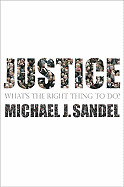

At its heart, Sandel's book offers a broad and, for the most part, readily comprehensible survey of some of the major theories of justice. He rejects the utilitarianism of Jeremy Bentham and its grounding of morality in the attempt to maximize the overall balance of pleasure over pain and is equally critical of the unbridled free market ideology of libertarianism. While more sympathetic to what he calls the "liberal neutrality" of Immanuel Kant and his modern counterpart John Rawls, he likewise finds their ideas wanting. But Sandel is more than a tepid repackager of received philosophical wisdom. He subjects each of these theories to a probing critique and is a witty and graceful writer who understands he's addressing the intelligent general reader, not an academic audience.
And it's that understanding that gives Justice its real zest. Sandel has richly seasoned his analysis with crisp treatments of an impressive array of contemporary social and political controversies: the familiar (abortion, stem cell research and the debate over same-sex marriage) and the obscure but no less thorny (whether a disabled professional golfer should be permitted to ride a cart or whether it would be appropriate to auction college admissions). In each instance he gently challenges us to question our conventional ways of thinking, relying on real (if occasionally bizarre) examples to push competing philosophical positions to their limits: If surrogate motherhood is O.K., why can't we simply buy babies? Is there a moral basis for limiting immigration or for laws that require government to "Buy American?" Is consensual cannibalism acceptable?
For Sandel, "a politics emptied of substantive moral engagement makes for an impoverished civic life." Instead, he advocates what he calls "a new politics of common good," one that "takes moral and spiritual questions seriously, but brings them to bear on broad economic and civic concerns, not only on sex and abortion." It's impossible to come away from this thoughtful book without feeling invigorated by the possibility of realizing that exalted vision, if only slightly daunted as to how it might be achieved.--Harvey Freedenberg
Shelf Talker: Harvard professor Michael Sandel offers an intellectually nimble survey of competing philosophies of justice against the backdrop of contemporary social issues.

